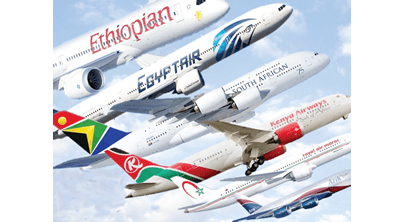African airlines are seeing growth and recovery after the devastating COVID-19. Major airplane makers like Boeing and Airbus are becoming bullish in the aircraft supply market. But all these fleet expansions would amount to nothing until most of the bottlenecks hindering development in the continent’s air transport market are removed, writes WOLE SHADARE
Bright future The outbreak of the coronavirus pandemic in 2019 shocked the world. The fortune of airlines, not only in Africa but globally, plummeted. Aviation and travel were the worst hit just as every other economic activity suffered. The result was bankruptcy for many of the continent’s airlines necessitating clamour for a bailout and economic stimulus. Despite the economic uncertainties, the International Air Transport Association (IATA) said there are plenty of reasons to be optimistic about 2023, predicting that it expects a return to profitability for the global airline industry in 2023 as airlines continue to cut losses stemming from the effects pandemic to their businesses. Aviation is a key contributor to global economic development, transporting people and goods across countries and stimulating economic activity, job creation, tourism, and trade. Ramping up capacity Consequently, African carriers, particularly Africa’s biggest airline, Ethiopian are ramping up capacity as the carrier lays out a growth plan through 2035. Ethiopian’s “Vision 2035” plans, confirmed recently, will introduce more than a hundred new aircraft to its fleet. Additionally, Ethiopian plans to add more cities to its network, totaling its destination network to more than 200 by 2035. The Star Alliance carrier is currently the largest airline in Africa and has sizeable operations. Mesfin Tasew, CEO of Ethiopian Airlines, said about the carrier’s strategic plans to grow. In vision 2035, it aimed to nearly double the number of destinations that it would be flying by increasing the number of destinations from 131 today to 207; and to cover this expansion, it also planned to double the number of aircraft in our flight from 140 to 271. “We have planned to carry 65 million passengers and three million tons of cargo. We aim to generate $25 billion in revenue by 2035,” he said. The new plan comes as the airline has already achieved its goal for 2025. Tasew said vision 2035 would sustain the carrier’s fast and profitable growth. The carrier has been recognised as the most reliable and financially successful airline in Africa, domestically and internationally. Ethiopian Airlines acquires stakes other in African carriers Ethiopia’s state-owned flag carrier is in talks with a number of African states to acquire stakes and manage operations – a strategy aimed at gaining a competitive advantage against rivals such as those in the Gulf. In September, Nigeria’s Minister of Aviation, Hadi Sirika, announced a consortium led by Ethiopian Airlines as the preferred bidder for shares in Nigeria Air, the national carrier the country seeks to revive. The mission happens to be one of President Muhammadu Buhari’s campaign promises and has been on the top burner for the president. Nigeria is the biggest aviation market in West Africa and winning the market gives any carrier a number of advantages. Sirika said that Ethiopian Airlines would own a 49 percent stake in the new airline deal. Whereas, the Nigerian Sovereign Fund will take 46 percent and the federal government will keep the remaining five percent. The minister added that Nigeria Air would have an initial capital of $300 million with plans to have 30 aircraft within four years. “We are going to bring in 6 Boeing 737 aircraft initially and between the third and fourth year the airline will be able to acquire up to 30 aircraft,” Sirika said. Chad’s Civil Aviation Authority, in 2018 said a new airline for the country ‘Tchadia Airlines, with the government owning 51 percent and Ethiopian Airlines the rest would be launched. The move would help Chad as it will improve its international air connections. In 2012, Chadian authorities suspended international flights operated by state carrier Toumai Air after an investigation revealed serious safety problems. The carrier has a number of stakes in many airlines in Africa. The airline owns a 24 percent shareholding in Lome-based ASKY, 49 percent in Malawi Airlines; 45 percent of Zambia Airways; 99 percent in Mozambique Airlines Limited among other airlines. African airlines are dusting off plans for operations in a post-pandemic market even as the continent faces mixed prospects in global air traffic recovery. The International Air Transport Association (IATA) predicted a firm path to the resumption of global air travel, with passenger numbers expected to surpass the 2019 peak in 2024. The bullish outlook is informed by the easing of travel restrictions in key markets as Covid-19 vaccinations reach optimal levels and infection rates recede. Airlines are buying aircraft, hiring new personnel, or adjusting schedules to shift capacity to markets that are opening up faster and cutting back or putting on hold planned route launches to restricted destinations. According to the African Airlines Association (AFRAA), four airlines continued with their route development plans during 2021 while another 11 either reopened existing routes or launched new ones. At the end of January 2022, airlines in the region had reinstated 78.7 percent of their pre-Covid capacity. Uganda Airlines which last year launched new services to Johannesburg and Dubai is hiring staff for its London office ahead of a much-anticipated commencement of services to the UK. Kenya Airways this week announced a network review that will see its London service revert to daily while Yaoundé will cease operating at the end of May. The continent’s airlines are seeing some modicum of growth but there still exist connectivity challenges that are capable of eroding the gains of whatever expansion they are making. The current African fleet is nearly 20 years old on average and the market craves more fuel-efficient aircraft to bring down the cost of operations improve safety and minimize service disruptions. Nigeria’s burgeoning domestic market The Nigerian airline industry has equally witnessed tremendous growth despite COVID-19. The airlines have recovered. They are said to be at over 75 recovery level of 2019 before the pandemic. Passenger traffic is on the rise with carriers like Air Peace, Ibom Air, start-ups like ValueJets, United Nigeria, and others increasing their fleet to match growth. In 2021, the Nigerian aviation sector witnessed considerable growth in passenger traffic of 45 percent, with 13 million travelers as opposed to nine million in the previous year. These numbers are even more impressive when it is considered that globally, growth was only 30 percent in the same period. No doubt, Africa requires a critical mass of airlines capacity to drive Africa-wide interconnectivity effectively and sustainably. Africa’s biggest five airlines including EgyptAir, Ethiopian, South African Airways, Royal Air Maroc, and Kenya Airways, have not been able to achieve this interconnectivity.
Bullish Airbus
Airbus’ outlook for Africa is more bullish than Boeing’s, with Airbus expecting 1,270 aircraft deliveries in the 2009 to 2028 period, comprised of 341 aircraft with fewer than 100 seats and 929 aircraft with more than 100 seats. This represents a more than doubling of the African passenger aircraft fleet.
According to Airbus, fleet growth would be boosted by intra-regional operations.
The manufacturer forecast that domestic and intra-regional traffic will increase by 5.6% in the 2009 to 2018 period and by 6.2% in the 2019 to 2028 period. Both Airbus and Boeing see opportunities arising from the need for replacing older aircraft in the region, particularly in the single-aisle market segment.
Last line
Given the huge gaps in interconnectivity around Africa, perhaps, setting up an airline alliance now may be most beneficial for Africa.
In effect, this alliance could enable as many airlines as possible to work cooperatively as members, creating unprecedentedly wider connections across the continent.



